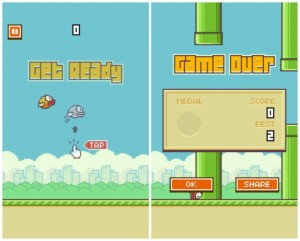If you’ve been following recent tech news, you may have heard about an app called Flappy Bird that has gone viral. Before the developer took down the app, Flappy Bird was the number one free app in both the Apple App Store and the Google Play Store.
Many people have criticized the game because it is too simple, the graphics are heavily borrowed from Nintendo’s Super Mario World, and that the game is unforgivingly difficult. But at the same time, I believe these criticisms are exactly what helped the game become so popular.
With regards to simplicity, there is an extremely low bar for entry to this game. If you can tap your finger on your smartphone screen, you can play this game. The way the developer programmed this game, you can load up the game and start playing in a matter of seconds, which seems to be a good attribute for smartphone games.
With the Nintendo graphics, I believe the controversy helped give this app free marketing. It gave tech blogs an interesting angle to write their posts about, and controversy helps drives more click through traffic. With the blog posts about the game reaching a wider audience, I think this helped drive app downloads.
Finally, the fact that the game is so difficult, gives the game it’s addictive and frustrating nature that has spawned many YouTube videos and hilarious comments in the app store review sections. It’s addictive nature is akin to a carnival game, where the premise looks so simple, but success is elusive. Furthermore, the time it takes to restart the game after a failure is so fast, that it seems to encourage a, ‘just once more’ sort of mindset.
Whether intentional or not, the developer of Flappy Bird seemed to nail three aspects of creating a wildly successful app: Low barrier to entry, creating controversy, and making the game hellishly addictive.

